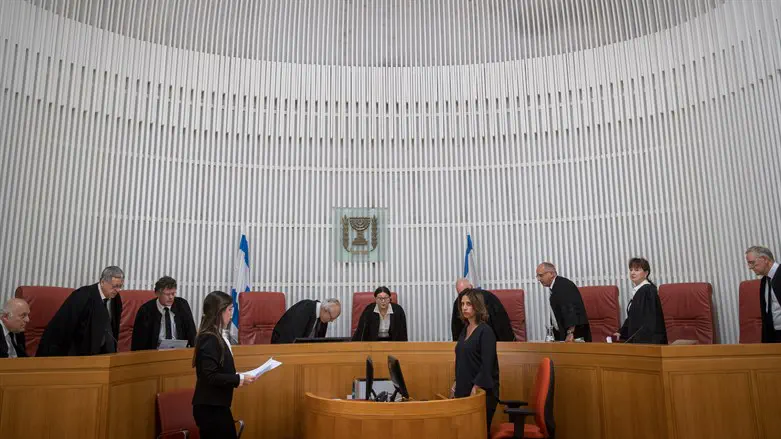
The judicial activism of Israel's Supreme Court has harmed the trust the public places in the judicial system, according to a Hebrew University study published today (Sunday) by Israel Hayom.
The research, conducted by Prof. Yonatan Givati and PhD student Aaron Gerber, uses a unique database that was unknown to legal researchers until today. This includes figures on public trust in the judicial system from 1991-2018, which appear to resolve the dispute between former Supreme Court Presidents Moshe Landau and Aharon Barak.
Barak believed that judicial criticism of the laws of the Knesset and judicial involvement in political questions will not harm the public's trust in the court. He claimed that trust will be maintained as long as the public is convinced of the professional motives of the judges and that the judges act impartially.
Unlike Barak, Landau believed that the judicial revolution would damage the public's trust in Supreme Court. According to him, the courts making decisions with regards to disputes about political and values and the overturning of Knesset laws cannot be done in an objective and neutral manner.
The study looks at the results of questionnaires from 40 countries which were taken in 1991, 1998, 2008, and 2018.
The respondents were asked to answer the question "How much trust do you have in the courts and the judicial system?", and other questions dealing with the Knesset, business and industry, the rabbinate and religious institutions and schools and the education system.
The study reveals the earliest data on public trust in the court available to researchers in Israel (with 4,500 respondents) so that it is possible to examine how the judicial revolution has affected this over the years. These are the only data whose collection began before the enactment of several crucial basic laws in 1992 and before the announcement of the judicial revolution in 1995 by Justice Barak.
The researchers claimed that "following the constitutional revolution, the percentage of respondents with a lot of trust in the Supreme Court decreased by about 30%" and stated that "no court in the world and no institution in Israel has seen such a dramatic decrease in trust in them during this period."
When examining the development of the level of trust over the years, the researchers found that compared to 1991, the percentage of Jews who have a lot of trust in the Supreme Court decreased by approximately 23% in 1998, by approximately 25% in 2008, and by approximately 29% in 2018. "We find no evidence of a change in trust in the courts among the non-Jewish population," they claimed.
The study shows that the decline also applies among academics, and that "even on the left side of the fence the decline was dramatic" and that there is no statistically significant relationship between the rise of social media and a decline in trust in the judicial system.
"The fact that a significant part of the decrease in trust in the court occurred before the introduction of social networks to Israel, and the fact that no connection was found between the use of social networks and trust in the court, makes it difficult to accept the claim that the decrease in trust was caused by social networks," they said.
The study excludes that the decrease in trust is part of the phenomenon of a decrease in trust in other state institutions. The data show that the decline in trust in the Supreme Court was 24% greater than the decline in public trust in the Knesset, the education system and religious institutions.
When the researchers compared the data to the other 40 countries in the surveys, they discovered that since the judicial revolution, the decline in trust in Israel is about 10% steeper than in all other countries, which further supports Justice Landau's assertions that the judicial revolution was the cause of much of the decline of trust in the judicial system in Israel. The researchers stated that further expansion of judicial discretion will increase public mistrust, and the result could endanger the independence of the judiciary. They estimated that the political attempts to restrain the court and limit its powers will increase.
